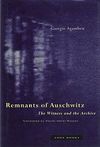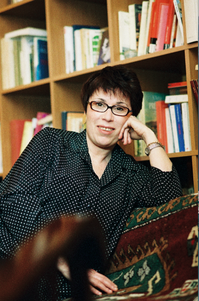Friday, May 27, 2011
Hate in the Past Tense: Understanding the Origins of Armenian Genocide Denial
You can still watch Keith David Watenpaugh's lecture "Hate in the Past Tense: Understanding the Origins of Armenian Genocide Denial as a Problem of Contemporary Reconciliation" on the CHGS YouTube channel CHGSumn.
A permanent link to the lecture is also available on our Armenian Genocide web page.
"Thoughts on Agamben's Remnants of Auschwitz: A Talk at the University of Minnesota." Now available
"Thoughts on Agamben's Remnants of Auschwitz: A Talk at the University of Minnesota." by Jeffrey Mehlman
 On April 13, Jeffrey Mehlman presented "Thoughts on Agamben's Remnants of Auschwitz: A Talk at the University of Minnesota." Prof. Mehlman's appearance was sponsored by University's Center for Holocaust and Genocide Studies as part of its "Alternative Narratives or Denial?" lectures.
On April 13, Jeffrey Mehlman presented "Thoughts on Agamben's Remnants of Auschwitz: A Talk at the University of Minnesota." Prof. Mehlman's appearance was sponsored by University's Center for Holocaust and Genocide Studies as part of its "Alternative Narratives or Denial?" lectures.You can read the paper by clicking on the link below.
Mehlman on Agamben 413011.pdf
Remnants of Auschwitz: The Witness and the Archive by Giorgio Agamben.
Labels:
"Holocaust Denial",
Agamben,
homepage,
Mehlman
Monday, May 9, 2011
A FILM UNFINISHED now streaming on Netflix and available for loan from CHGS
A FILM UNFINISHED is a film of enormous import, documenting some of the worst horrors of our time and exposing the efforts of its perpetrators to propel their agenda and cast it in a favorable light.
Educators, a study guide is available for download in (PDF).
2FilmUnfinishedGuide-FormatRevised_pat_11_16_nb-1.pdf
You may borrow the film from CHGS beginning Thursday, May 12. Please contact Laura Lechner by email lech0045@umn.edu or phone at 612-624-0256 to learn how you can reserve a copy.
Régine Waintrater's "Testimony: Genocide and Transmission" available to view online
 On March 28, 2011 Régine Waintrater presented a paper entitled "Testimony: Genocide and Transmission" at the University of Minnesota. Prof. Waintrater's appearance was sponsored by University's Center for Holocaust and Genocide Studies.
On March 28, 2011 Régine Waintrater presented a paper entitled "Testimony: Genocide and Transmission" at the University of Minnesota. Prof. Waintrater's appearance was sponsored by University's Center for Holocaust and Genocide Studies.
CHGS is pleased to announce its new YouTube Channel, CHGSumn, where you can view her lecture. A print version in of the talk is availableTestimony Genocide and Transmission.pdf.
Régine Waintrater is a psychoanalyst, family therapist, and an associate professor at the Université Paris 7-Diderot. Her practice as a therapist is critical of the ideology of testimony as catharsis. Waintrater has been involved in the Fortunoff Video Archive for Holocaust Testimonies at Yale University Library, and in the USC Survivors of the Shoah Visual History Foundation, two important projects of testimony collection. She is the author of Sortir du genocide (Out of Genocide: Testifying to Learn to Live Again).
Further Reading (including some of the sources cited in the lecture):
Améry, Jean. At the Mind's Limits: Contemplations by a Survivor on Auschwitz and Its Realities.
Delbo, Charlotte. Days and Memory.
Hatzfeld, Jean. Into the Quick of Life.
Langer, Lawrence. Holocaust Testimonies: The Ruins of Memory.
Levi, Primo. The Drowned and the Saved.
Levi, Primo. Survival in Auschwitz.
Ricoeur, Paul. Oneself as Another.
 On March 28, 2011 Régine Waintrater presented a paper entitled "Testimony: Genocide and Transmission" at the University of Minnesota. Prof. Waintrater's appearance was sponsored by University's Center for Holocaust and Genocide Studies.
On March 28, 2011 Régine Waintrater presented a paper entitled "Testimony: Genocide and Transmission" at the University of Minnesota. Prof. Waintrater's appearance was sponsored by University's Center for Holocaust and Genocide Studies.CHGS is pleased to announce its new YouTube Channel, CHGSumn, where you can view her lecture. A print version in of the talk is availableTestimony Genocide and Transmission.pdf.
Régine Waintrater is a psychoanalyst, family therapist, and an associate professor at the Université Paris 7-Diderot. Her practice as a therapist is critical of the ideology of testimony as catharsis. Waintrater has been involved in the Fortunoff Video Archive for Holocaust Testimonies at Yale University Library, and in the USC Survivors of the Shoah Visual History Foundation, two important projects of testimony collection. She is the author of Sortir du genocide (Out of Genocide: Testifying to Learn to Live Again).
Further Reading (including some of the sources cited in the lecture):
Améry, Jean. At the Mind's Limits: Contemplations by a Survivor on Auschwitz and Its Realities.
Delbo, Charlotte. Days and Memory.
Hatzfeld, Jean. Into the Quick of Life.
Langer, Lawrence. Holocaust Testimonies: The Ruins of Memory.
Levi, Primo. The Drowned and the Saved.
Levi, Primo. Survival in Auschwitz.
Ricoeur, Paul. Oneself as Another.
Monday, May 2, 2011
The Thinking Person's Guide to the Holocaust
The Jewish Daily Forward compiled a list of valuable artwork and literature about the Holocaust as suggested by readers and several scholars as a way to mark Holocaust Remembrance Day and provide an entry to the subject.
The Jewish Daily Forward
April 28, 2011
A Way To Begin
With the help of your suggestions, Lawrence L. Langer, Michael Berenbaum, Joanne Weiner Rudof and Paula Hyman have compiled this all too brief list of writers, scholars and works. The list includes paintings, novels, memoirs, films, poems and graphic works, as well as historical studies. It provides a possible first step for those who would consider themselves Holocaust literate.
The hundreds of suggestions that we received, and the hundreds more that our consultants discussed, reinforced our sense that there is an almost endless supply of valuable and high-quality works of art and scholarship about the Holocaust. Our intention is not to be populist, exclusive or exhaustive (were it even possible), but to map a way into the subject.
Reading literature without knowing history is impossible. One cannot appreciate the literature of the Holocaust without grounding in its history. But conversely, one cannot understand the Holocaust without the insight of witnesses and great artistic or literary figures. This list, with a number of your comments included, is a distillation of a body of work that you have told us about and which is expanding every year. We have organized the following titles not as a definitive list, but rather, on Yom HaShoah of 5771, as a way to begin. -- Dan Friedman
For the list and more click here.
The Jewish Daily Forward
April 28, 2011
A Way To Begin
With the help of your suggestions, Lawrence L. Langer, Michael Berenbaum, Joanne Weiner Rudof and Paula Hyman have compiled this all too brief list of writers, scholars and works. The list includes paintings, novels, memoirs, films, poems and graphic works, as well as historical studies. It provides a possible first step for those who would consider themselves Holocaust literate.
The hundreds of suggestions that we received, and the hundreds more that our consultants discussed, reinforced our sense that there is an almost endless supply of valuable and high-quality works of art and scholarship about the Holocaust. Our intention is not to be populist, exclusive or exhaustive (were it even possible), but to map a way into the subject.
Reading literature without knowing history is impossible. One cannot appreciate the literature of the Holocaust without grounding in its history. But conversely, one cannot understand the Holocaust without the insight of witnesses and great artistic or literary figures. This list, with a number of your comments included, is a distillation of a body of work that you have told us about and which is expanding every year. We have organized the following titles not as a definitive list, but rather, on Yom HaShoah of 5771, as a way to begin. -- Dan Friedman
For the list and more click here.
Labels:
art,
Breaking News on the Web,
history,
Holocaust,
literature
Subscribe to:
Posts (Atom)
© Regents of the University of Minnesota. All rights reserved. Equal opportunity educator and employer.